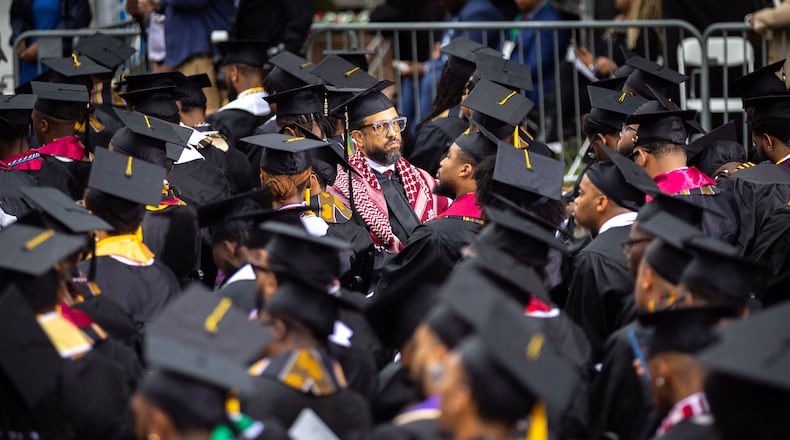During last year’s college commencement season, several Georgia schools saw pro-Palestine protests during ceremonies.
This year, they are navigating an uncertain federal landscape where the funding they largely depend on, and perhaps their autonomy and academic freedom, is at risk. Those tensions could play out during this year’s ceremonies that begin this weekend at Georgia Tech and Oglethorpe University.
President Donald Trump’s first 100 days in office have been a shock to the American higher education system. Multi-million grants in Georgia have been terminated, sinking research projects midflight. Diversity, equity and inclusion programs have been restructured to comply with new federal mandates. International students fearing deportation have seen their immigration status canceled without warning.
Will this unprecedented moment in higher education be met with protest as Georgia students celebrate their academic achievements?
Three hours west of Atlanta, some protests are already scheduled. When Trump arrives to give a commencement speech at the University of Alabama Thursday evening, he’ll reportedly be greeted by at least two demonstrations. Former U.S. Sen. Doug Jones of Alabama and former U.S. Rep. Beto O’Rourke of Texas are expected to attend.
Georgia has recent experience with presidential protests. Last year, then-President Joe Biden was met with some criticism at Morehouse College. When Biden’s motorcade arrived to the private historically Black college for his commencement speech, a protester held a sign calling him “Genocide Joe.” Several dozen marched toward campus calling for a ceasefire in the Israel-Hamas war and accused Biden of enabling Israel’s bombing of Gaza. Inside the ceremony, a professor and a few students turned their backs to Biden during his commencement address.
Individual protests during graduation season are common, said Lindsey Tepe, director of government relations for the American Council on Education. “Carrying signs, having messages on graduation caps, that sort of thing you definitely see every year,” she said. But 2024 was unique. After a year of pro-Palestine demonstrations at many universities, commencement offered a capstone opportunity for student protesters.
“Last year was a particular moment in time culminating a particularly eventful year of protest on campus,” Tepe said.
Following a week of pro-Palestinian demonstrations on its Atlanta campus, Emory University moved its commencement ceremonies to Gas South Arena in Duluth, 22 miles from campus. While the school cited security concerns for the change, skeptics said it was an effort to avoid more protests.
At Georgia State University, two students, including one who tried to walk the stage with a Palestinian flag, were escorted out of the ceremony. The school said they had caused disruptions.
Campuses have been quieter in 2025. And while the Trump administration has implemented policies that could upend higher education, Tepe said there hasn’t been a single unifying issue that’s caused widespread national demonstrations.
Tepe said whether there is a protest during a ceremony this year could depend on the climate at each individual school. Some campuses, like Harvard University, have seen intense pressure from the Trump administration. That could trigger student demonstrations. Other schools, like those in Georgia, have not seen that level of federal pressure. Or at least not publicly.
As for the commencement speakers, Tepe expects most of them to touch on typical themes about the value of an education, not politics. Educator/activist Cornel West, who ran for president last year, might be one of the exceptions when he gives the commencement address at Morehouse.
Graduating students will soon be putting their education to use as they begin their careers. Speakers are likely to emphasize that point as students, their friends and families celebrate the milestone on graduation day.
“What that means in this moment may feel political but it is really just a fact,” Tepe said. “Their education has value and they’re going to go do meaningful things with what they’ve learned.”
About the Author
Keep Reading
The Latest
Featured


